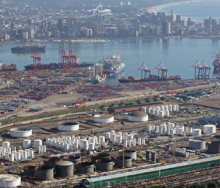JOHANNESBURG – The National Union of Mineworkers (NUM) said on Monday it would embark on a national protest against the planned closure of Eskom power stations, accusing the power utility of sidelining it in reaching the decision to uplift renewable energy.
Eskom is preparing to shut down five power stations in a bid to boost renewable energy and support independent power producers (IPPs). The power stations to be shut down are Hendrina, Kriel, Komati, Grootvlei and Camden in Mpumalanga.
Eskom spokesperson, Khulu Phasiwe, confirmed that the power supplier had already begun a phase-out process to decommission the power stations over the next 10 years in a bid to reduce greenhouse carbon emissions, saying that one of the ways was to have renewable energy.
Phasiwe said Eskom was in the process of registering more renewables and that it was signing contracts with companies to produce and supply 4 000MW to the national grid.
“Eskom trucks supply 40 million tonnes of coal to our power stations. We have already reduced that demand by three million tonnes and it will be further reduced to 15.6 million tonnes over five years in 2022,” Phasiwe said.
Hundreds of truck drivers contracted to Eskom blocked various highways in Pretoria last week in protest against the power utility’s decision to make use of more renewable energy instead of coal. The Coal Transportation Forum said 30 000 employees working for Eskom would be out of jobs if the five power stations were closed down.
In a statement, the NUM said that the decision to source more renewable energy from IPPs was to “effectively privatise Eskom”.
“The NUM has noted that the decision has already been taken without our involvement to partly privatise Eskom. We view the entrance or the inclusion of IPPs to the energy sphere as privatisation brought to Eskom through the back door,” NUM said.
“As much as we support green energy, we cannot ignore scientific facts that green energy is not as cheap as it is portrayed by the capitalists who are dealing with it.”
Eskom generates, transmits and distributes approximately 95% of the electricity used in South Africa and approximately 45% of the electricity used in Africa, mostly using coal.
Phasiwe said the unions were part of Eskom stakeholders and would be consulted about the decision, but unfortunately the power supplier was overtaken by last week’s events. He said Eskom, at this moment, could not avoid the chain reaction that would result from the closure of its power stations.
“Unfortunately, it will have a ripple effect on coal suppliers if there is no demand from Eskom. We don’t close down power stations because we want to. We are implementing a directive given us to give more renewables to diversify our energy mix. We are implementing a government policy.”
The NUM said if IPPs were introduced to the national grid, the impact on South Africa’s economy would be major retrenchments in the energy and mining sectors as IPPs were not labour-intensive, and that the whole supply chain in the coal industry would be affected.
“We have therefore concluded that we will have a national march that will begin as soon as possible to protest against the signing of the inclusion of IPPs to the national grid. The action will include mass action and educating the public on the real impact of the IPPs on the price of electricity,” NUM said.
“The NUM supports green energy but we do not support backdoor privatisation of Eskom in the form of IPPs.”













